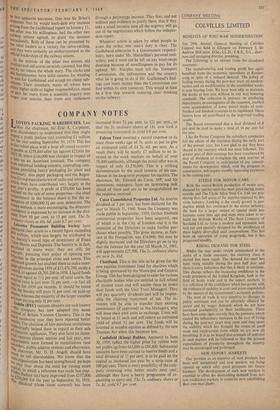COMPANY NOTES
LLOYD'S PACKING WAREHOUSES. Last May the chairman, Sir Eric A. Carpenter, gave shareholders to understand that they might ec.xPect a profit (before tax) exceeding £1 million ,tnr the year ending September 30, 1959: This has In fact taken place with a large all-round recovery 'in Profits at £278,880 after tax against £25,616 for 9S7"58, when £146,000 was charged in respect of .' loss on an American contract. The company is an industrial holding concern, controlling corn- Pantes providing heavy packaging for plant and machinery, also paper packaging and the ReFn- (en.e Group manufacturers of radio and television, which must have contributed very largely to the Past year's profits. A profit of £703,000 has been realised on the sale of some properties—the chief rice'nolitment in the balance sheet is for the re- demption of £200,000 31 per cent. debenture. The :tore outlook is more encouraging, the directors' confidence is expressed by an increase in the divi- dend from 10 per cent. to 15 per cent. The Ss. °rid:nary shares at 44s. 6d. yield 6.7 per cent. Leicester Permanent Building Society haye Pereased their assets to a record figure excee i ding million, which can largely be attributed to .1` e Society's So ety's novel type of investment of Fixed ertIn Shares and Deposits. The Society is, in fact, r"ahead in many ways; they are still, for bIrr'Ple, pursuing their policy of opening new. airlehes in the principal cities and towns. This 'round growth has enabled them to make mort- ree advances during 1959 of £15,476,700, easily a aereI3rd, as against £8,701,200 in 1958. Liquid funds 're– now equal to 111 per cent. of total assets, the serve ratio is just over 51 per cent.—in fact all SShat for 1959 are records. It should be noted , rit the Society still pays 31 per cent. on paid-up :tares, whereas the majority of the larger societies are now Paying only 31 per cent. Goblin
(HVC) vacuum cleaners are well known the
in„ Company has now adopted this name th''ead of British Vacuum Cleaners. This is the rfd successive year they have reported better :sults. The abolition of hire-purchase restrictions of,ndoubtedly helped them in regard to their sale trt,dt°rnestic appliances. They also have an indus- de„–„ vacuum cleaner section and last year, new recorders, were formed to manufacture time 'erders, public address systems and electronics. much The chairman, Mr. 0. D. Angell, should have
to tell shareholders. We know that the
We organisation has been strengthened; perhaps ea,.,.ThaY hear about the need for raising more prvenal, to which a reference was made last year. to :Its (before tax) have improved from £157,000 11,‘–'50,000 for the year to September 30, 1959.
dividend (three times covered) has been
increased from 71 per cent. to 121 per cent., so that the .5s. ordinary shares at 13s. now look a promising investment to yield 4.9 per cent.
Falcon Trust received a record response to its issue three weeks ago of 5s. units at par to give an estimated yield of £4 2s. 6d. per cent. As a result there will be nearly £7 million to be in- vested in the stock markets on behalf of over 58,000 applicants, although the initial offer was in respect of only £1,250,000. This is a striking demonstration by the small investor of his con- fidence in the long-term prospect for equities. The chairman, Mr. Edward du Cann, MP, and his investment managers, have an interesting task ahead of them and are to be congratulated on the response received.
Cator Consolidated Properties Ltd. An interim dividend of 3 per cent. has been declared for the year to March 31, 1960. Since the Company was made public in September, 1959, further freehold commercial properties have been acquired, one of which is in the City of London and it is the intention of the Directors to make further pur-' chases when possible. The gross income, as fore- cast in the Prospectus, was £16,000; this may be slightly increased and the Directors go on to say that the forecast for the year till March 31, 1961, will approximate £27,500. The 2s. ordinary shares are now 2s. 41d.
Charifund. This is the title to be given for the new equities investment fund for charities which is being sponsored by the Municipal and General Group. This has been designed to cater for various charitable bodies who are entitled to full refund of income taxes and will enable them to invest their funds with the Unit Trust Managers. They will pay quarterly dividends and will be respon- sible for claiming repayment of tax. The in- vestors will be able to transfer their existing investments (if approved) to the Managers, who will issue their own units in exchange. Units will be issued at £1 each and will return an estimated ,yield of about 31 per cent. The funds will be invested in suitable equities as defined by the new Trustees Act when this becomes law.
Castlefield (Kiang) Rubber, Accounts to June 30, 1959, reflect the higher price for rubber with net profits up from £65,000 to £88,800. Substantial amounts have been carried to reserve funds and a total dividend of 35 per cent. is to be paid on the capital as increased last year by a scrip issue of 100 per cent. There is every possibility of the com- pany returning even better results next year,
although they have a heavy programme of re- planning to carry out. The 2s. ordinary shares at 7s. 3d. yield 9.7 per cent.










































 Previous page
Previous page